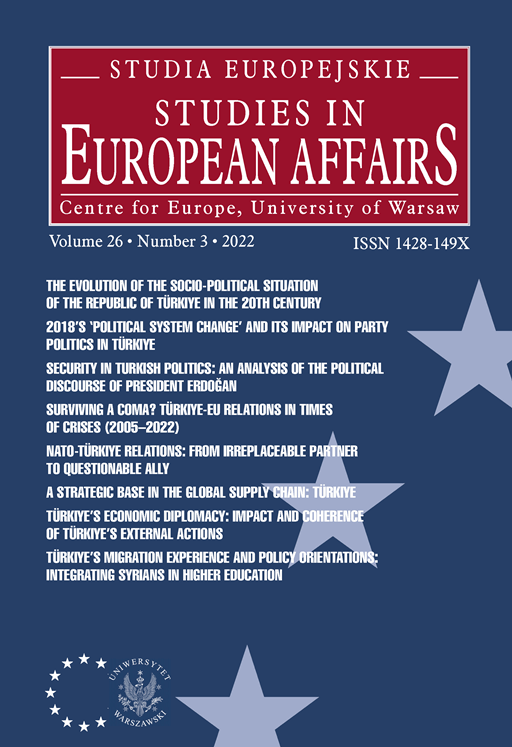
ISSUE: 3/2022
- Volume 26
- Number 3
- 2022
Subscribe NEWSLETTER
Studia Europejskie –
Studies in European Affairs
ISSN: 1428-149X
e-ISSN: 2719-3780
License
Articles published in the journal are under a Creative Commons Attribution – Non Commercial – No Derivatives 4.0 International License
The Evolution of the Socio-political Situation of the Republic of Türkiye in the 20th Century – Efforts Towards the Europeanisation of the Society and State
Abstract
The events related to the collapse of the Ottoman Empire and the proclamation of the Republic of Türkiye contributed to a complete departure from the system of constitutional monarchy in favour of a parliamentary democracy. Owing to the decisions on Europeanisation and implemented reforms, i.e., adopting a Civil Code based on the Swiss code, a Criminal Code reflecting the Italian code, a Commercial Code underpinned by the German code (1924), and the transition to the Latin alphabet which replaced Arabic (1928), as well as education reforms (1925), women’s suffrage (1934), and the
introduction of surnames (1935), etc. the Turkish people became a European society, aware of their rights and obligations. The transition from a singleparty regime to a multi-party period (1946) allowed for democracy to be consolidated. Türkiye’s participation in strictly European and international political and military organisations was of vital significance and turned the country into an extremely important state. Its failed efforts to join the EEC, and, subsequently, the European Union, resulted in Türkiye abandoning its interest in this form of cooperation (1997). The socio-political transformations that took place in the 20th century, highlighted in this article, characterise this dynamically changing period. The evolution of the views of Turkish society was clearly marked in the second half of the 20th century, which led to serious changes in the mindsets of the Turkish people and completely altered the image of the country
post-2002, allowing the newly established Justice and Development Party to assume power (2002).
References
Akşin, S. (1983) Istanbul Hükümetleri ve Milli Mücadele. Istanbul: Turkiye Bankasi.
Bayraktar, B., Karakaş, M. and Özsoy, H. (eds.) (2005) Osmanlı Devletini Parçalama Plânları in: Çağdaş Türkiye Tarihi. Istanbul, pp. 77–82.
Bayraktar, T. (1985) Milli Mücadele. Ankara.
Chmielowska, D. (2008) Emancypacja kobiety tureckiej in: Chmielowska D. et al. (eds.) Być kobietą w Oriencie. Warszawa: Wydawnictwo Akademickie Dialog.
Chmielowska, D. (2018) Lustrzane odbicie rzeczywistości. Warszawa: Wydawnictwo Akdemickie Dialog.
CHP (2022) Cumhuriyet Halk Partisi. Available at: http://chp.org.tr (Access 1.09.2022)
Gevgilili, A. (1990) 2000’li Yılların Türkiye’si Için Yeni Bir Demokratik Platform Gündem in: Türkiye’de Yenileşme Düşüncesi, Sivil Toplum, Basın ve Atatürk. Istanbul: Bağlam Yayınları, pp. 146–157.
Gökberk, M. (1997) Aydınlanma Felsefesi, Devrimler ve Atatürk. Istanbul: Kirmizi Kedi Yayinevi.
Inalcik, H. (2010) From Empire to Republic. Ankara: Isis Press. DOI: https://doi.org/10.31826/9781463230098.
Inalcik, H. (2020) Ataturk ve demokratik Turkiye. Ankara: Kronik Kitap.
Jevakhoff, A. (2004) Kemal Atatürk. Warszawa: Wydawnictwo Akademickie Dialog.
Karpat, H. (1959) Turkey’s Politics. The Transition to a Multiparty System. Princeton: Princeton University Press. DOI: https://doi.org/10.1515/9781400879427.
Kołodziejczyk, D. (2003) Turcja. Warszawa: Wydawnictwo TRIO.
Küçükcan, T. (2011) “Sacralization of the State and Secular Nationalism: Foundations of Civil Religion in Turkey”, The George Washington International Law Review. Vol. 41, No. 4, pp. 963–983.
Mondros Ateşkes Antlaşı Ve Uygulanışı, (No Date) pp. 93–103.
Nadi, N. (1971) 27 Mayıs’tan 12 Mart’a. Istanbul: Sinan Yayınları.
Nitecka-Jagiełło, B. (1981) Polityka nad Bosforem. Warszawa: Wydawnictwo MON.
Ortayli, I. (2007) Turkiye Teskilat ve Idare Tarihi. Istanbul: Cedit Neşriyat.
Ortayli, I. (2010) Turkiye’ Yakin Tarihi. Istanbul: Timaş.
Ortayli, I. (2015) Tukiye: Nin Tarihi. Istanbul: Timas Yayinlari.
Ortayli, I. (2018) Gazi Mustafa Kemal Ataturk. Istanbul: Kronik Kitap.
Öktem, N. (1972) Saltanatın Kaldırılması. Izmir: Evren Tarih Yayinlari.
Özgür, Ö. (1975) 100 Soruda Türkiye’da Kapitalizmin Gelişmesi. Istanbul: Gerçek Yayınevi.
Parla, T. (1993) Türkiye’nin Siyasal Rejimi 1980–1989. Istanbul: İletişim Yayınlar.
Poznańska, K. (1970) Turcja stara i nowa. Warszawa: Ludowa Spółdzielnia Wydawnicza.
Poznańska, K. (1977) Republika Turecka. Warszawa: Krajowa Agencja Wydawnicza.
Seydi, S. (2006) 1939–1945 Zor Yıllar! Ankara: Asil Yayın Dağıtım.
Sonyel, J.B. (2003) Atatürk, The Grand Turk. London: Cyprus-Turkish Association.
Süslü, A. (2002) Atatürk Araştırma Merkezi in: Türkiye Cumhuriyeti Tarihi. t. 1. Ankara: Atatürk Research Centre.
Tunaya, T. (1952) Türkiye’de Siyasi Partiler. Istanbul: Arba Araştırma Basım Yayın.
Turquia Basin-Yayin ve Enformasyon General Müolürlügü (1982) Turkey Yearbook, Prime Ministry, Directorate General of Press and Information
Turkish News Agency (2000) Turkey 2000, Ankara: Directorate General of Press and Information.
Velidedeońlu, H.V. (1973) C.H.P. Iktidarı (1942–1950) in Türkiye’de Üç Devir. t. 2. Istanbul: Ikinci Cilt.
Villata, J.B. (1979) Atatürk. Ankara: Tü rk Tarih Kurumu Basımevi. Volkan, V.D. and Itzkowitz, N. (2007) Ölümsüz Adam. Ankara.
Wituch, T. (1986) Od Trypolisu do Lozanny. Warszawa: Wydawnictwo Naukowe PWN.
Zürcher, E.J. (2013) Turcja. Od sułtanatu do współczesności. Kraków: Wydawnictwo Uniwersytetu Jagiellońskiego.
DOI: 10.33067/SE.3.2022.1
Language: English
Pages: 7-29
How to Cite:
Harvard
Chmielowska, D. (2022) "The Evolution of the Socio-political Situation of the Republic of Türkiye in the 20th Century – Efforts Towards the Europeanisation of the Society and State". Studia Europejskie – Studies in European Affairs, 3/2022, pp. 7-29. DOI: 10.33067/SE.3.2022.1